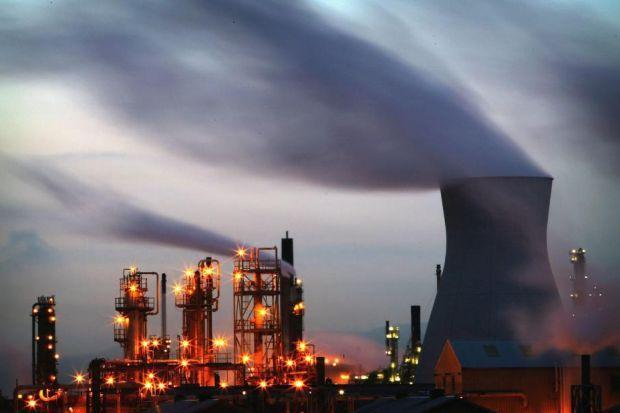Ineos Grangemouth to become net zero with hydrogen and carbon capture plans
By David Bol @mrdavidbol
Political Corresponden
21st September, 2021

Ineos will decarbonise its Grangemouth operations by 2045
SCOTLAND'S single biggest polluter will spend more than £1 billion to eliminate its contribution to emissions by 2045 – harnessing green hydrogen and carbon capture technology.
Ineos Grangemouth will transform its operations to net zero by 2045 – the legal date the Scottish Government has set for the entire nation.
Earlier this year, the Herald on Sunday revealed that the company's billionaire boss, Jim Ratcliffe, snubbed an appearance in front of MSPs investigating how to transform Grangemouth in a carbon neutral hub – but the company has now brought forward its own plans and funding.
Ineos, which has cut its emissions at Grangemouth by more than one third since 2005, has already committed more than £500 million on projects currently being rolled out to reduce pollution. A new energy plant, due to be completed in 2023 will supply energy to all site operations and cut at least 150,000 tonnes of carbon each year.
Ineos’s operations at Grangemouth will see greenhouse gas emissions cut by more than 60% by 2030 through investments, partnerships and innovative engineering.
The company’s strategy involves a move to the production and use of hydrogen by all businesses at the Grangemouth site along with carbon capture and storage of at least 1 million tonnes per year of carbon dioxide by 2030.
This will include capturing carbon dioxide from existing hydrogen production and the construction of a huge carbon capture enabled hydrogen production plant.
READ MORE: Ineos boss snubs MSPs investigating Scotland's zero carbon future
The Acorn carbon capture and storage project, being brought forward by Pale Blue Dot Energy as part of the Neccus coalition, hopes to be able to store carbon from Scottish industries and talks had been held earlier this year for businesses at Grangemeouth to use the infrastructure to clean up their operations.
As well as a solution for the pollution caused by the North Sea oil and gas industry, the Acorn project hopes to transport carbon from Grangemouth along the existing Feeder 10 pipeline as well as it being shipped in via Peterhead Port.
Stuart Collings, CEO of Ineos O&P UK, said: “Our challenge is to deliver a road map which ensures a just transition to net zero. This can only be achieved if we remain globally competitive and we stay ahead of evolving regulations and legislation.
“Hydrogen will play a very important role in the decarbonisation of our manufacturing plants. Building the infrastructure for large scale utilisation of hydrogen creates a foundation to achieve net zero by 2045 and enables wider use of hydrogen by Ineos and others in and around Grangemouth.”
Andrew Gardner, chairman INEOS Grangemouth, added: “We actually have to go much further than the significant CO2 reductions we’ve achieved already.
“By 2045 we have to be net zero equivalent and we have to set some really ambitious but achievable targets for ourselves for 2030.”
READ MORE: Grangemouth carbon-free plans at risk over funding fight with English project
Extra contributions to driving down emissions at Grangemouth will come from further investments in energy reduction and electrification of key equipment – with Scotland's electricity supply mostly produced from renewable sources.
The company will also issue a shift in its polymer product portfolio to include higher levels of post-consumer recycled materials.
The commitment has been welcomed by the Scottish Government.
SNP Net Zero Secretary, Michael Matheson, said: “I welcome this significant investment, which demonstrates Ineos's support for Scotland’s journey to becoming a net-zero economy by 2045.
“This will not only drive forward innovation and diversification to tackle emissions at Grangemouth, but will also support the decarbonisation of other sectors, sites and regions across Scotland.”
Warnings have been issued that plans to clean up Grangemouth could be put at risk if funding is instead handed to a similar project in the north east of England – leaving the two industrial hubs fighting over cash.
The chemicals industry has highlighted concerns that without solid business cases being drawn up to decarbonise the UK’s heavy industries, there is a risk “investment goes to assets overseas where more money can be made” instead of remaining in Grangemouth and other British hubs – throwing the long-term future of one of Scotland’s biggest employers into doubt.
Mr Matheson added: “Low-carbon hydrogen offers the swiftest decarbonisation route for our industrial sector and today’s commitment by Ineos makes an even stronger case for the UK Government to select the Scottish cluster, which Ineos partnered with in the summer, to be among the first carbon capture and storage clusters to be awarded funding through its current cluster sequencing process.
“Grangemouth, and Ineos itself, already holds a wealth of experience in engineering solutions and hydrogen production, and this new investment holds great potential for the future of Grangemouth, as well as the vital jobs that are located there, as part of our just transition to net zero.”
No comments:
Post a Comment